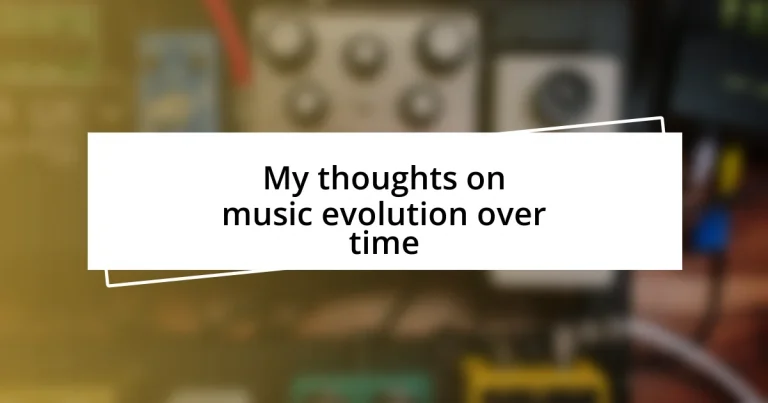Key takeaways:
- The evolution of music reflects cultural shifts, with genres like blues, rock ‘n’ roll, and hip-hop demonstrating emotional depth and social commentary.
- Technological advancements have transformed music creation and distribution, democratizing access and inspiring innovation among artists.
- Notable musicians, such as Elvis Presley, Nina Simone, and David Bowie, have used their platforms to challenge societal norms and spark conversations about identity and social change.
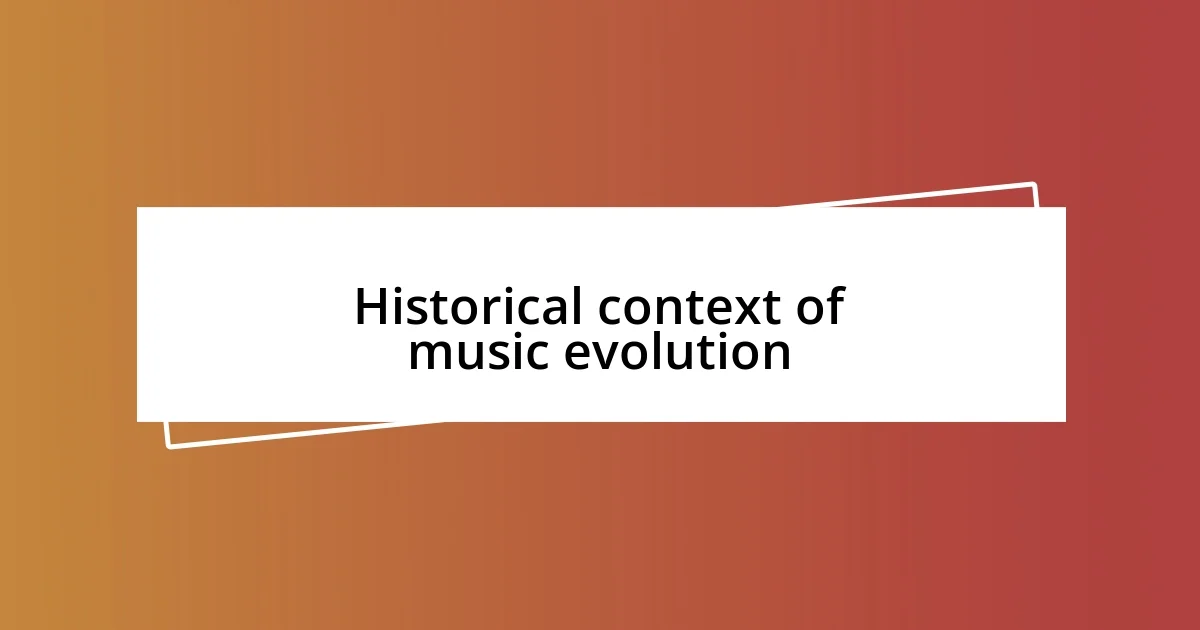
Historical context of music evolution
The evolution of music can be traced back to ancient civilizations, where early humans expressed their emotions through rhythm and melody. I often think about how, in a way, those primal sounds laid the groundwork for every genre we enjoy today. Have you ever listened to a piece of music and felt an inexplicable connection to something greater? It’s fascinating to realize that those initial forms of expression were meant to connect people, much like music does for us now.
As societies advanced, so did the complexity of music. The Renaissance period, for example, introduced harmony in a way that was revolutionary at the time. I remember visiting an exhibition on Renaissance music and being mesmerized by how composers like Palestrina shifted the listener’s experience, creating layers and textures that were unthinkable before. Doesn’t it make you wonder how musical innovations reflect the cultural shifts of their eras?
Jumping forward to the 20th century, we see how music mirrored the tumult of the times, from jazz embodying the spirit of the Roaring Twenties to punk rock as a form of rebellion against the status quo. I can still recall the thrill of first hearing a classic punk song and feeling that surge of energy—it was like a direct chat with the anxieties and hopes of a generation. This emotional depth is what makes understanding the historical context of music so crucial; it’s not just about the notes, but the stories and feelings they convey.
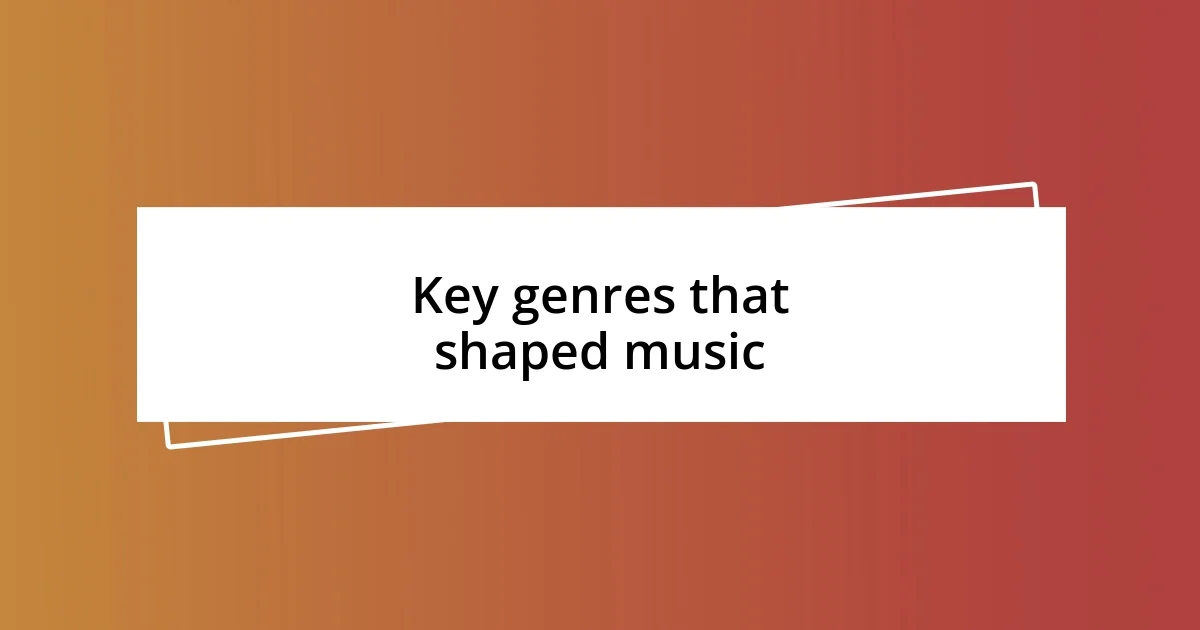
Key genres that shaped music
As I delve into the key genres that shaped music, the impact of blues can’t be overlooked. Emerging from the African American communities in the late 19th century, blues brought raw emotion and storytelling to the forefront. I remember listening to B.B. King’s “The Thrill Is Gone” for the first time; it was as if every note resonated with the struggles and heartaches of life, and I found myself deeply moved by the connection it created.
Then there’s rock ‘n’ roll, which exploded onto the scene in the 1950s. This genre not only transformed musical landscapes but also influenced youth culture immensely. When I first heard Elvis Presley’s “Jailhouse Rock,” I felt a sense of rebellion and freedom wash over me, evoking memories of late-night drives with friends, where the world felt limitless and alive. It’s incredible how music can encapsulate the spirit of a generation.
Hip-hop, of course, deserves a mention as well. Originating in the South Bronx in the 1970s, it became a powerful means of expression and community for marginalized voices. I can clearly recall the first time I heard Grandmaster Flash. It wasn’t just a catchy beat; it was storytelling at its best, sharing life experiences that resonated on personal and societal levels. Each of these genres not only shaped the musical landscape but also reflected and influenced the cultural evolution of society.
| Genre | Key Influence |
|---|---|
| Blues | Emotion and storytelling |
| Rock ‘n’ Roll | Youth culture and rebellion |
| Hip-Hop | Voices from marginalized communities |
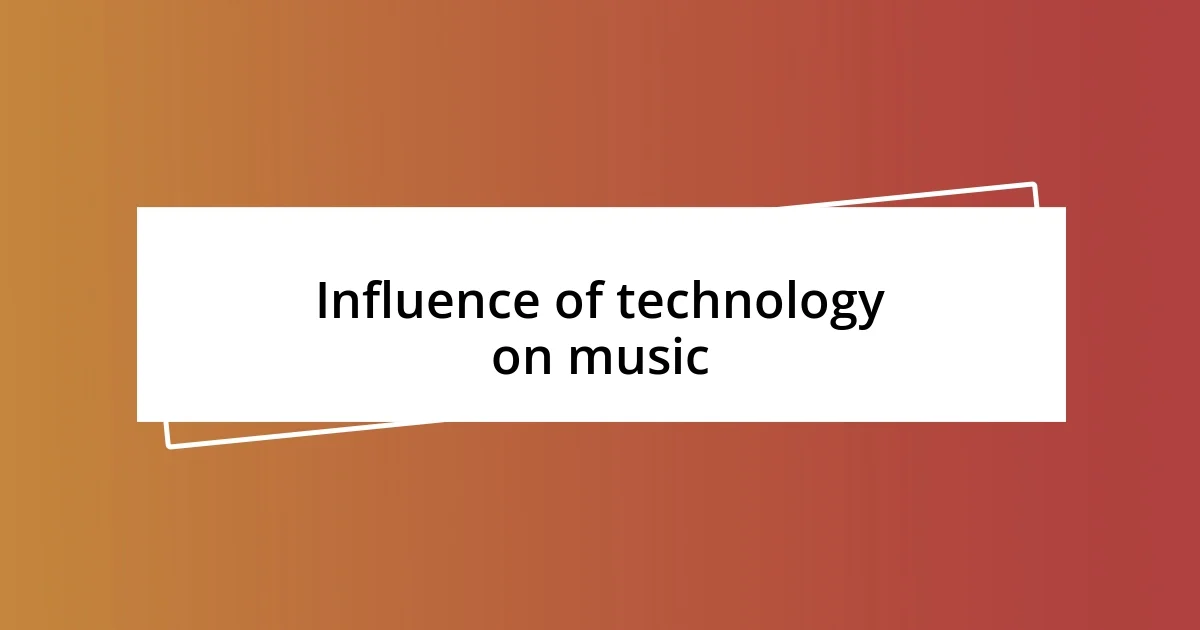
Influence of technology on music
The influence of technology on music is a fascinating journey that I’ve found incredibly transformative. I remember the first time I used digital audio workstations (DAWs) to create my own music—suddenly, I could layer sounds and manipulate rhythms in ways that were previously unimaginable. It felt like having a full studio at my fingertips! Technology has not only democratized music production but also broadened our access to a diverse range of sounds and influences, allowing us to experiment and innovate in ways that resonate with personal expression.
Here’s a closer look at some key technological advancements that have reshaped music:
- Recording Techniques: The shift from analog to digital recording improved sound quality significantly. I often think about how this has affected everything from an artist’s creative process to the listening experience.
- Streaming Platforms: Services like Spotify and Apple Music have made music accessible on a global scale. I can recall finding new artists by simply exploring playlists curated for my tastes—what a game changer that was!
- Music Software: Tools such as GarageBand or Ableton Live empower anyone, regardless of their skill level, to compose music. I still vividly remember the excitement of producing my first track in a simple app, feeling like I had entered a whole new world of creativity.
- Social Media: Platforms like TikTok have led to the viral success of countless songs. It’s amazing to see artists gain recognition overnight simply because their music connects with listeners emotionally.
These technological innovations have not only enhanced how we create and consume music but have also fundamentally altered the very essence of the music industry. It’s remarkable to witness how something as simple as an app can inspire a new generation of musicians to share their stories.
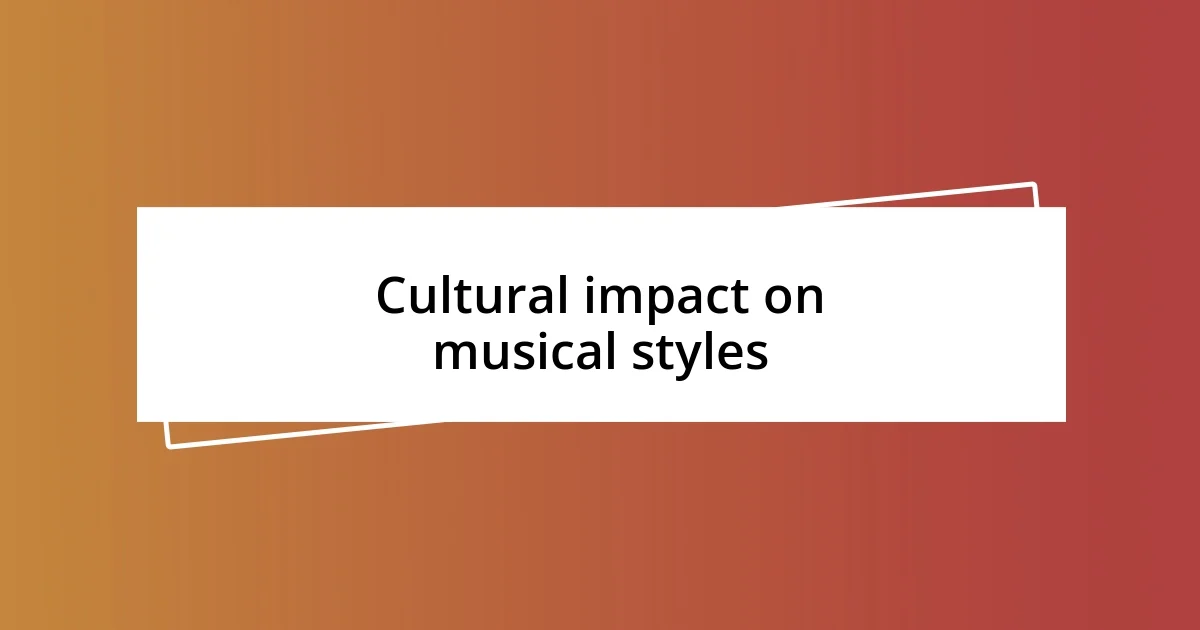
Cultural impact on musical styles
The influence of culture on musical styles is profound and deeply intertwined with social movements. For instance, when I think of reggae, I can’t help but feel the rhythm of resistance and resilience that emerged from Jamaica in the 1960s. It’s fascinating how artists like Bob Marley used their music to spread messages of hope and social justice, creating a soundtrack for the fight against oppression. It makes me wonder—how many of today’s artists are crafting similar anthems for our current struggles?
As musical styles evolve, they often reflect the cultural dynamics of their time. I vividly remember attending a local hip-hop show, feeling the energy of community and expression that filled the space. The lyrics tackled issues like systemic racism and personal identity, resonating with everyone in the room. It’s in moments like these that I realize culture isn’t just a backdrop for music; it actively shapes the narratives artists create and how listeners connect to those stories.
When I explore genres such as K-pop, I see how global influences have led to a unique fusion of styles and cultures. I remember feeling that rush of excitement when I first heard BTS’s “Dynamite.” The way they blended catchy melodies with vibrant visuals drew me in. It sparked my curiosity about how cultural exchange enriches musical evolution, prompting me to ponder whether any one culture can truly claim ownership over a style when it evolves through collaboration and shared experiences.
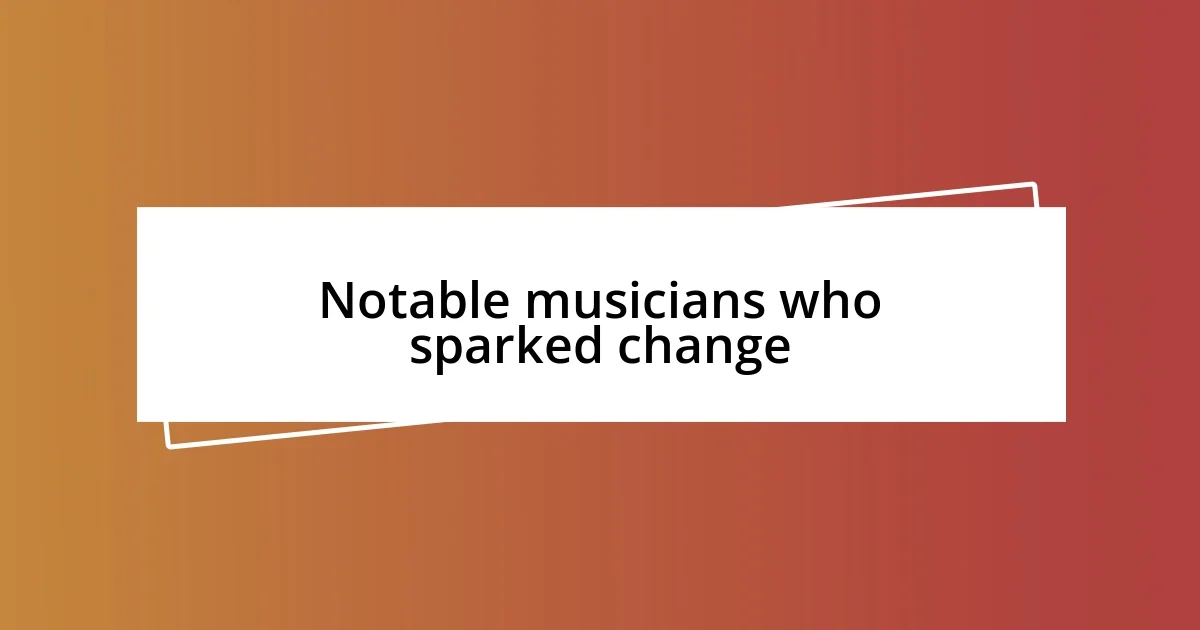
Notable musicians who sparked change
Some musicians have revolutionized not just their genres but also the global music landscape. Take Elvis Presley, for example. His blend of rock and roll with rhythm and blues wasn’t just about catchy tunes; it questioned societal norms and broke racial barriers. I remember my first listen to “Jailhouse Rock,” and how it made me appreciate the cultural shift he represented. Could it be that music has the power to challenge perceptions and bring people together?
Then there’s the impact of artists like Nina Simone. Her song “Mississippi Goddam” was more than music; it was a veiled protest against racial injustice that still resonates today. I recall sitting in my living room, feeling the weight of her words. It made me think deeply about the role of music in social change and wondered: how many of us are willing to speak out through our creativity?
And how could I discuss influential musicians without mentioning David Bowie? His androgynous persona and boundary-pushing sound redefined gender identity in music. I can still picture the first time I watched him on stage—it was mesmerizing! Bowie ignited a conversation about self-expression and authenticity that feels just as relevant now as it did in the ’70s. Don’t you think that the willingness to defy convention can inspire countless others to embrace their own differences?
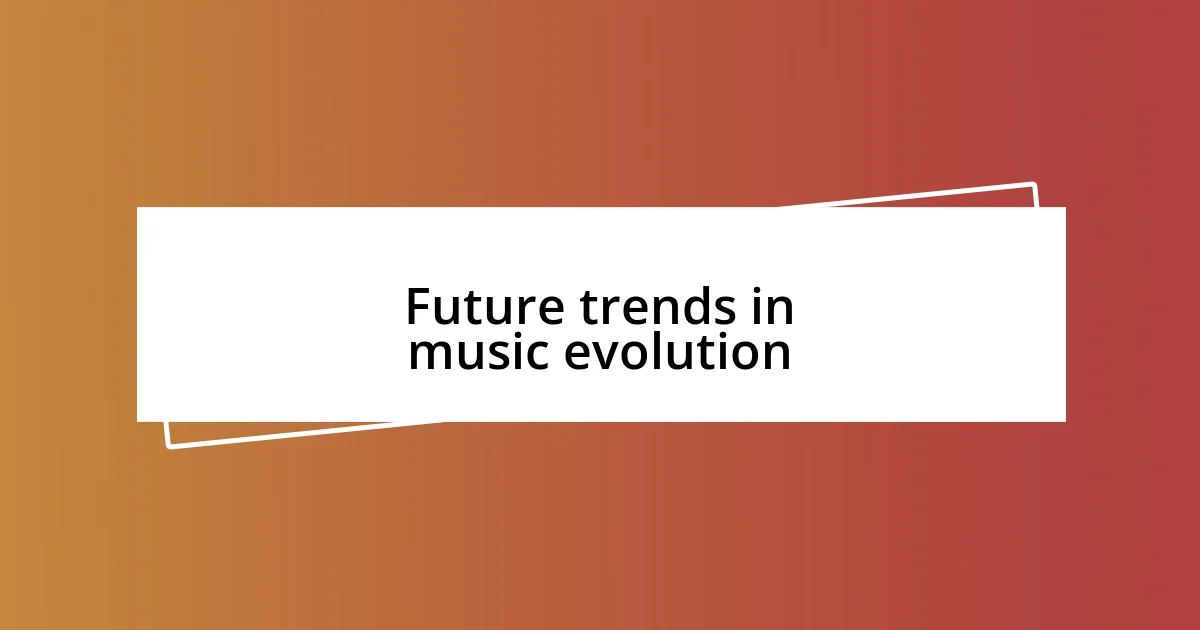
Future trends in music evolution
As I look to the horizon of music’s evolution, one trend that captivates my imagination is the rise of artificial intelligence in music creation. I recall a moment when I first explored AI-generated songs; the novelty was astounding. But it left me pondering—how will this technology shape the authenticity of human emotion in music? Will we still crave the raw vulnerability that only a real human experience can provide, or will we embrace these digital creations as the norm?
Moreover, the blending of genres seems destined to become even more pronounced. Imagine a world where artists effortlessly fuse elements of traditional folk music with cutting-edge electronic beats. I had an experience at a music festival where an artist combined flamenco guitar with synthpop, and the result was electrifying! It stirred something deep within me—an appreciation for the boundless creativity that emerges when cultures collide. This trend could redefine what music means to us, challenging our preconceived notions of genre and style.
Finally, the increasing importance of social media platforms as launching pads for new talent cannot be overlooked. I remember scrolling through TikTok and being blown away by a teenager who created a viral dance to an original song. It struck me how easily and quickly an artist can gain visibility in today’s digital landscape. I wonder, is this shift democratizing music, allowing diverse voices to rise, or might it lead to homogenized trends dictated by algorithms? The future of music feels as much about technology and community as it is about melody and lyrics.
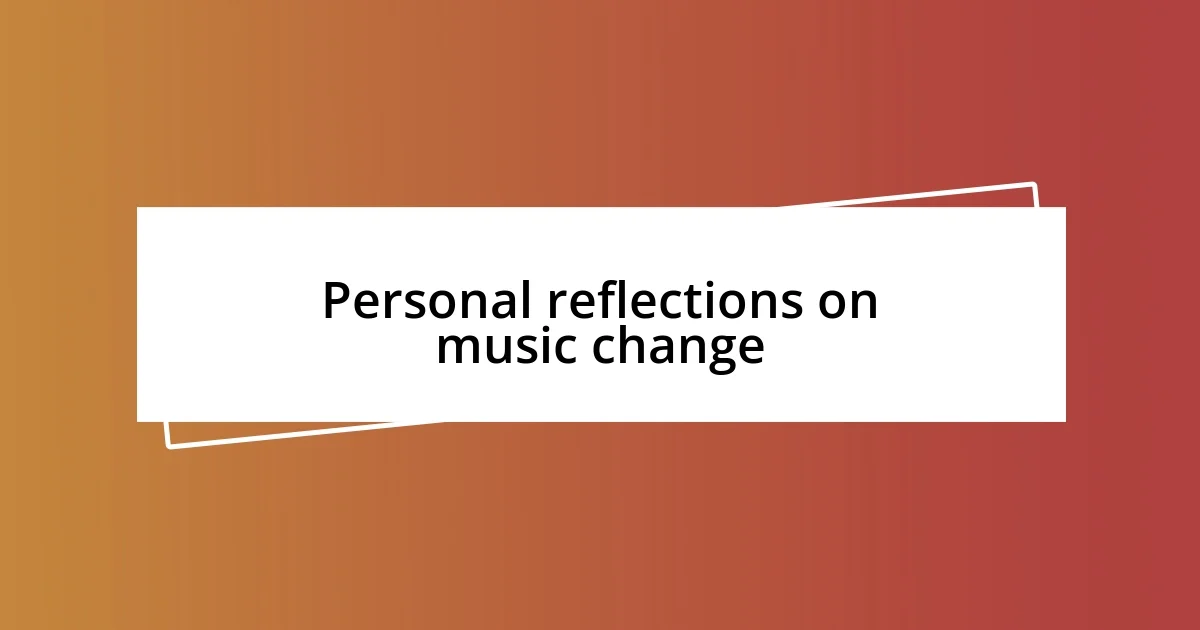
Personal reflections on music change
As I reflect on the changes music has undergone, I can’t help but think about how it mirrors our society’s evolution. I recall late-night conversations with friends, where we’d dissect the lyrics of our favorite bands, realizing how songs like “Imagine” by John Lennon weren’t just melodies; they were blueprints for a vision of unity. Isn’t it fascinating how music can ignite discussions that shape our collective consciousness?
When I listen to contemporary artists blending different genres, I feel a thrill of excitement. I remember attending a local gig where a hip-hop artist collaborated with a classical violinist. Their unexpected fusion created an atmosphere that left everyone breathless. This experience made me wonder—how much more can we innovate if we remain open to unconventional combinations in music?
Moreover, there’s an undeniable emotional connection that seems to evolve along with the music itself. I think back to the first time I heard Billie Eilish’s haunting voice. It resonated with feelings of loneliness and vulnerability that felt so relatable. This shift towards raw honesty in lyrics today prompts me to ask: how can we use these narratives to foster deeper connections in a world that often feels fragmented?












